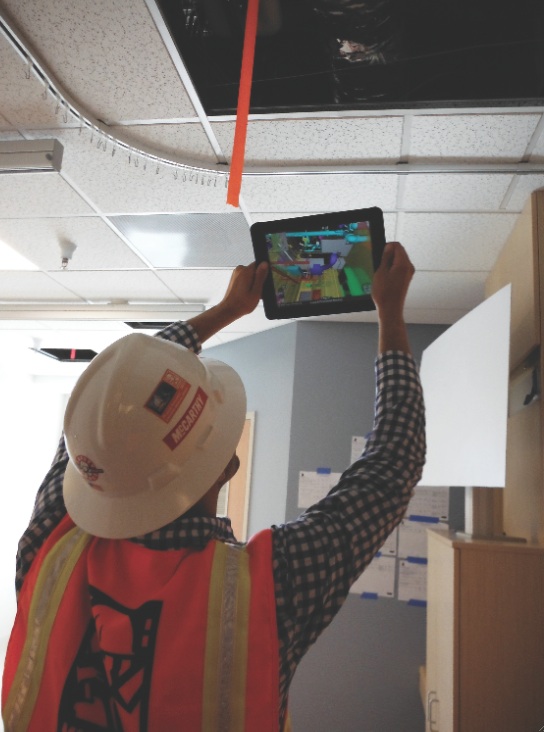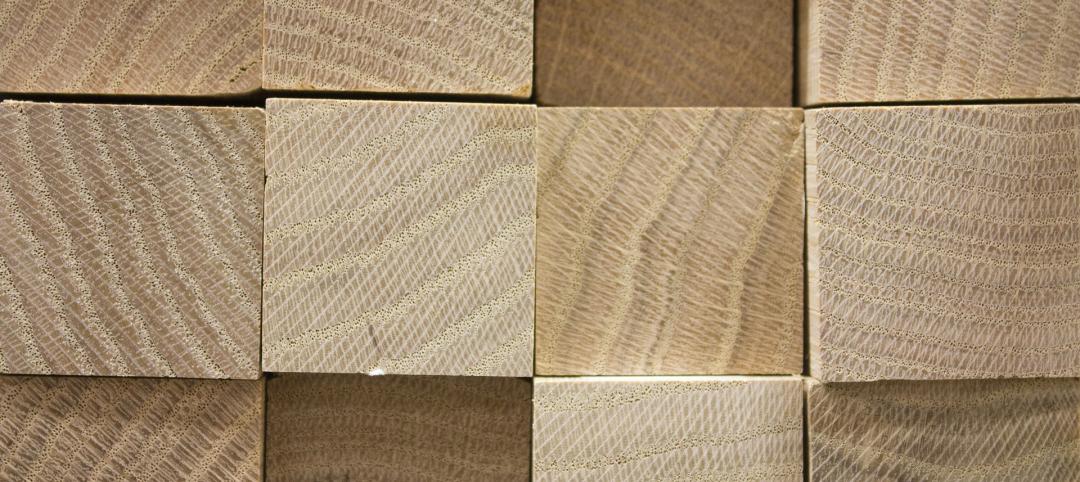Building Design+Construction reached out to AEC professionals who have studied and applied augmented reality and asked them to pinpoint applications that are ripe for the technology. Here’s what they had to offer:
1. Business development. Three-dimensional models are great for communicating your vision for a building project, but imagine the impact of being able to take potential clients on a walking virtual tour of a design scheme while on the site. For instance, some luxury condo developers are testing AR for use by their sales teams for virtual tours during the preconstruction and construction phases. And some high-end homebuilders are using the technology in their physical model homes to better demonstrate upgrade options.
2. Design visualization at all phases. Any time there’s data to be visualized, there’s a good case for AR, says Autodesk’s Dace Campbell, AIA, LEED AP. “Photo-matching is a common practice for many designers, using tools like Photoshop to show ‘what if’ scenarios overlaid in a real context,” he says. “AR supports the rapid study of design alternatives, with real-time photo-matching from any viewpoint, and at full scale.”
3. Survey and layout. “Whether you’re surveying the real world to gather data to put into a virtual model or are doing layout with survey tools, to me that’s a strong case for augmented reality,” says Campbell. “If we had accurate, dependable position tracking, arguably you wouldn’t need a tape measure. It would be the next generation of the total station, where the virtual projection shows you precisely where each component of the building gets installed. Except, unlike with a total station, layout is done intuitively and in real time.”
4. Design analysis. With AR, virtually any analysis a Building Team already does on screen—seismic analysis, acoustic performance, structural modeling, etc.—hypothetically can be performed in the physical space. “We can already do that with today’s CAD and BIM tools, but AR will enable us to perform analysis at full scale while walking around a project site,” says Campbell.
5. Design assistance and constructability review. Being able to perform constructability review in situ during construction with both the architect and contractor standing in the same space has tremendous potential for enhancing communication and confidence, as well as cost and time savings.
6. Scheduling and site logistics planning. AR can extend today’s 4D scheduling tools to the project site, enabling a real-time look at the actual progress of a construction project compared to the planned progress while team members are touring the construction site. It can also be used to help visualize phased site logistics on complex projects.
7. Prefabrication. “Some forward-thinking contractors are looking at AR to support prefabrication inside a shop,” says Campbell. An advantage to prefabrication is higher quality, since laborers are assembling components in a factory, away from inclement weather.
8. General fabrication installation. Firms can use AR to help guide a building component into place. Furthermore, AR can support the installation effort by augmenting the laborer’s view with specific assembly instructions, specifications, and relevant standards.
9. Quality control, punch lists, and inspections. Whether it’s a municipality official doing an inspection or a contractor checking construction, quality control is an easy entry point into AR for many firms. For example, an inspector can make sure all the sleeves are in the right location before they complete formwork for a shear wall. Being able to overlay the BIM model of what was intended versus what is actually in place could offer huge benefits for construction teams.
10. Safety. AR can enable teams to do spatial safety audits, making sure, for example, work isn’t taking place above or below other critical work. Also, hazardous work and critical emergency information could be highlighted in an AR view so that all workers are aware of on-site hazards and remedies. For instance, laborers doing hot work on a roof could be alerted to the location of the nearest fire extinguishers.
11. Commissioning. With AR, you can overlay metadata onto the assets in the facility and extend what has taken place during punch listing and inspections. Agents responsible for commissioning and testing can have relevant information about a building asset available to them in context, without having to search through reports and logs to find or enter a specific point of information.
12. Facility operations and maintenance. Campbell calls AR the “ultimate stud finder.” Provided that the BIM model is updated to offer an accurate representation of what was built, facilities professionals can use AR to look behind walls, above ceilings, and below floors without ever touching the space. A facility engineer could get a pretty good idea of where building systems reside without performing destructive demolition and surveying.
Read our full report on augmented reality for the AEC field.
Related Stories
Senior Living Design | Apr 24, 2024
Nation's largest Passive House senior living facility completed in Portland, Ore.
Construction of Parkview, a high-rise expansion of a Continuing Care Retirement Community (CCRC) in Portland, Ore., completed recently. The senior living facility is touted as the largest Passive House structure on the West Coast, and the largest Passive House senior living building in the country.
Hotel Facilities | Apr 24, 2024
The U.S. hotel construction market sees record highs in the first quarter of 2024
As seen in the Q1 2024 U.S. Hotel Construction Pipeline Trend Report from Lodging Econometrics (LE), at the end of the first quarter, there are 6,065 projects with 702,990 rooms in the pipeline. This new all-time high represents a 9% year-over-year (YOY) increase in projects and a 7% YOY increase in rooms compared to last year.
Architects | Apr 24, 2024
Shepley Bulfinch appoints new Board of Director: Evelyn Lee, FAIA
Shepley Bulfinch, a national architecture firm announced the appointment of new Board of Director member Evelyn Lee, FAIA as an outside director. With this new appointment, Lucia Quinn has stepped down from the firm’s Board, after serving many years as an outside board advisor and then as an outside director.
ProConnect Events | Apr 23, 2024
5 more ProConnect events scheduled for 2024, including all-new 'AEC Giants'
SGC Horizon present 7 ProConnect events in 2024.
75 Top Building Products | Apr 22, 2024
Enter today! BD+C's 75 Top Building Products for 2024
BD+C editors are now accepting submissions for the annual 75 Top Building Products awards. The winners will be featured in the November/December 2024 issue of Building Design+Construction.
Laboratories | Apr 22, 2024
Why lab designers should aim to ‘speak the language’ of scientists
Learning more about the scientific work being done in the lab gives designers of those spaces an edge, according to Adrian Walters, AIA, LEED AP BD+C, Principal and Director of SMMA's Science & Technology team.
Resiliency | Apr 22, 2024
Controversy erupts in Florida over how homes are being rebuilt after Hurricane Ian
The Federal Emergency Management Agency recently sent a letter to officials in Lee County, Florida alleging that hundreds of homes were rebuilt in violation of the agency’s rules following Hurricane Ian. The letter provoked a sharp backlash as homeowners struggle to rebuild following the devastating 2022 storm that destroyed a large swath of the county.
Mass Timber | Apr 22, 2024
British Columbia changing building code to allow mass timber structures of up to 18 stories
The Canadian Province of British Columbia is updating its building code to expand the use of mass timber in building construction. The code will allow for encapsulated mass-timber construction (EMTC) buildings as tall as 18 stories for residential and office buildings, an increase from the previous 12-story limit.
Standards | Apr 22, 2024
Design guide offers details on rain loads and ponding on roofs
The American Institute of Steel Construction and the Steel Joist Institute recently released a comprehensive roof design guide addressing rain loads and ponding. Design Guide 40, Rain Loads and Ponding provides guidance for designing roof systems to avoid or resist water accumulation and any resulting instability.
Building Materials | Apr 22, 2024
Tacoma, Wash., investigating policy to reuse and recycle building materials
Tacoma, Wash., recently initiated a study to find ways to increase building material reuse through deconstruction and salvage. The city council unanimously voted to direct the city manager to investigate deconstruction options and estimate costs.

















